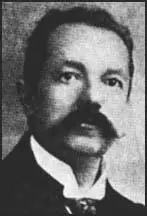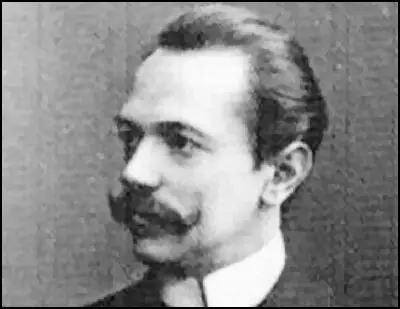Emil Eichhorn

Emil Eichhorn was born in Chemnitz-Röhrsdorf on 9th October, 1863. He became an apprentice as a glass worker in 1878. Eichhorn became active in politics and became a member of the Social Democratic Party (SDP). He also wrote for socialist newspapers.
In 1893 Eichhorn became a full-time party official of the SDP. On the outbreak of the First World War, the SDP leader, Friedrich Ebert, ordered members in the Reichstag to support the war effort. Karl Liebknecht was the only member of the Reichstag who voted against Germany's participation in the war.
In April 1917 left-wing members of the Social Democratic Party formed the Independent Socialist Party. Members included Eichhorn, Kurt Eisner, Karl Kautsky, Rudolf Breitscheild, Julius Leber, Ernst Thälmann, Emil Eichhorn and Rudolf Hilferding.
In August 1918 Eichhorn became director of the Berlin office of ROSTA, the Soviet News Agency, as head of its Russian section. On 9th November, 1918, he was appointed head of the Police Department. As Rosa Levine pointed out: "A member of the Independent Socialist Party and a close friend of the late August Bebel, he enjoyed great popularity among revolutionary workers of all shades for his personal integrity and genuine devotion to the working class. His position was regarded as a bulwark against counter-revolutionary conspiracy and was a thorn in the flesh of the reactionary forces."

On 4th January, 1919, Friedrich Ebert, Germany's new chancellor, ordered the removal of Eichhorn, as head of the Police Department. Chris Harman, the author of The Lost Revolution (1982), has argued: "The Berlin workers greeted the news that Eichhorn had been dismissed with a huge wave of anger. They felt he was being dismissed for siding with them against the attacks of right wing officers and employers. Eichhorn responded by refusing to vacate police headquarters. He insisted that he had been appointed by the Berlin working class and could only be removed by them. He would accept a decision of the Berlin Executive of the Workers' and Soldiers' Councils, but no other."
Members of the Independent Socialist Party and the German Communist Party jointly called for a protest demonstration. They were joined by members of the Social Democratic Party who were outraged by the decision of their government to remove a trusted socialist. Eichhorn remained at his post under the protection of armed workers who took up quarters in the building. A leaflet was distributed which spelt out what was at stake: "The Ebert-Scheidemann government intends, not only to get rid of the last representative of the revolutionary Berlin workers, but to establish a regime of coercion against the revolutionary workers. The blow which is aimed at the Berlin police chief will affect the whole German proletariat and the revolution."
One of the organisers of the protests, Paul Levi, argued: "The members of the leadership were unanimous: a government of the proletariat would not last more than a fortnight... It was necessary to avoid all slogans that might lead to the overthrow of the government at this point. Our slogan had to be precise in the following sense: lifting of the dismissal of Eichhorn, disarming of the counter-revolutionary troops, arming of the proletariat. None of these slogans implied an overthrow of the government."
Friedrich Ebert, Germany's new chancellor, called in the German Army and the Freikorps to bring an end to the rebellion. By 13th January, 1919 the rebellion had been crushed and most of its leaders were arrested. This included Rosa Luxemburg, Karl Liebknecht and Wilhelm Pieck on 16th January. Paul Frölich, the author of Rosa Luxemburg: Her Life and Work (1940) has explained what happened next: "A short while after Liebknecht had been taken away, Rosa Luxemburg was led out of the hotel by a First Lieutenant Vogel. Awaiting her before the door was Runge, who had received an order from First Lieutenants Vogel and Pflugk-Hartung to strike her to the ground. With two blows of his rifle-butt he smashed her skull. Her almost lifeless body was flung into a waiting car, and several officers jumped in. One of them struck Rosa on the head with a revolver-butt, and First Lieutenant Vogel finished her off with a shot in the head. The corpse was then driven to the Tiergarten and, on Vogel's orders, thrown from the Liechtenstein Bridge into the Landwehr Canal, where it was not washed up until 31 May 1919."
Eichhorn later commented: "The Berlin proletariat was sacrificed to the carefully calculated and artfully executed provocation of the government of the day. The government sought the opportunity to deal the revolution its death blow... Although to some extent armed, the proletariat was in no way equipped for serious fighting; it fell into the trap of the pacification negotiations and allowed its strength, time and revolutionary fervour to be destroyed. In the meantime, the government, having at its disposal all the resources of the state, could prepare for its final subjugation."
After the suppression of the Spartacus Uprising, Eichhorn went into hiding. In 1920 he joined the German Communist Party but remained a supporter of the theories of Rosa Luxemburg and this brought him into conflict with Vladimir Lenin and Leon Trotsky. In 1921 Paul Levi resigned as chairman of the KPD over policy differences. Later that year, Lenin and Trotsky, demanded that he should be expelled from the party. Eichhorn resigned along with Levi.
Emil Eichhorn died in Berlin on 26th July, 1925.
Primary Sources
(1) Rose Levine-Meyer, Levine: The Life of a Revolutionary (1973)
A member of the Independent Socialist Party and a close friend of the late August Bebel, he (Emil Eichhorn) enjoyed great popularity among revolutionary workers of all shades for his personal integrity and genuine devotion to the working class. His position was regarded as a bulwark against counter-revolutionary conspiracy and was a thorn in the flesh of the reactionary forces.
(2) Chris Harman, The Lost Revolution (1982)
The Berlin workers greeted the news that Eichhorn had been dismissed with a huge wave of anger. They felt he was being dismissed for siding with them against the attacks of right wing officers and employers. Eichhorn responded by refusing to vacate police headquarters. He insisted that he had been appointed by the Berlin working class and could only be removed by them. He would accept a decision of the Berlin Executive of the Workers' and Soldiers' Councils, but no other.

